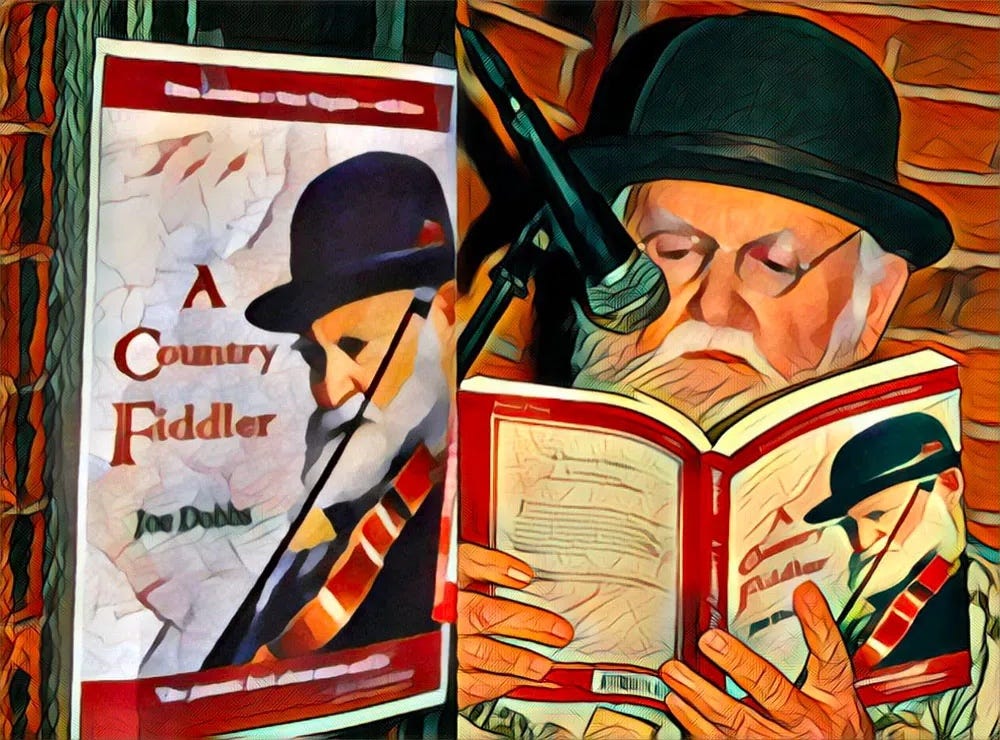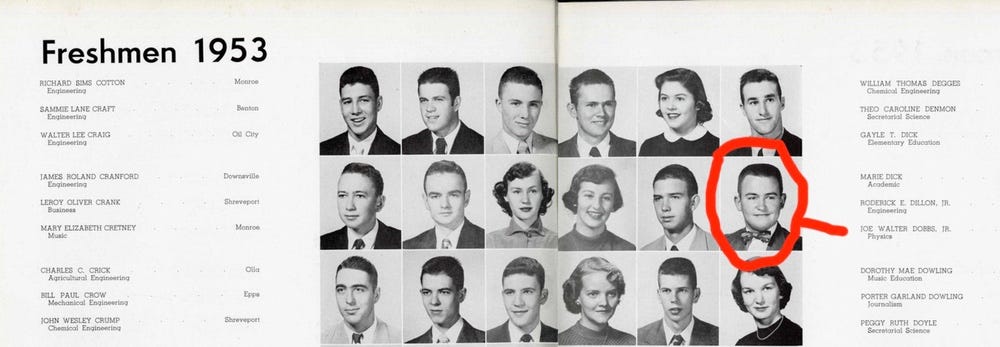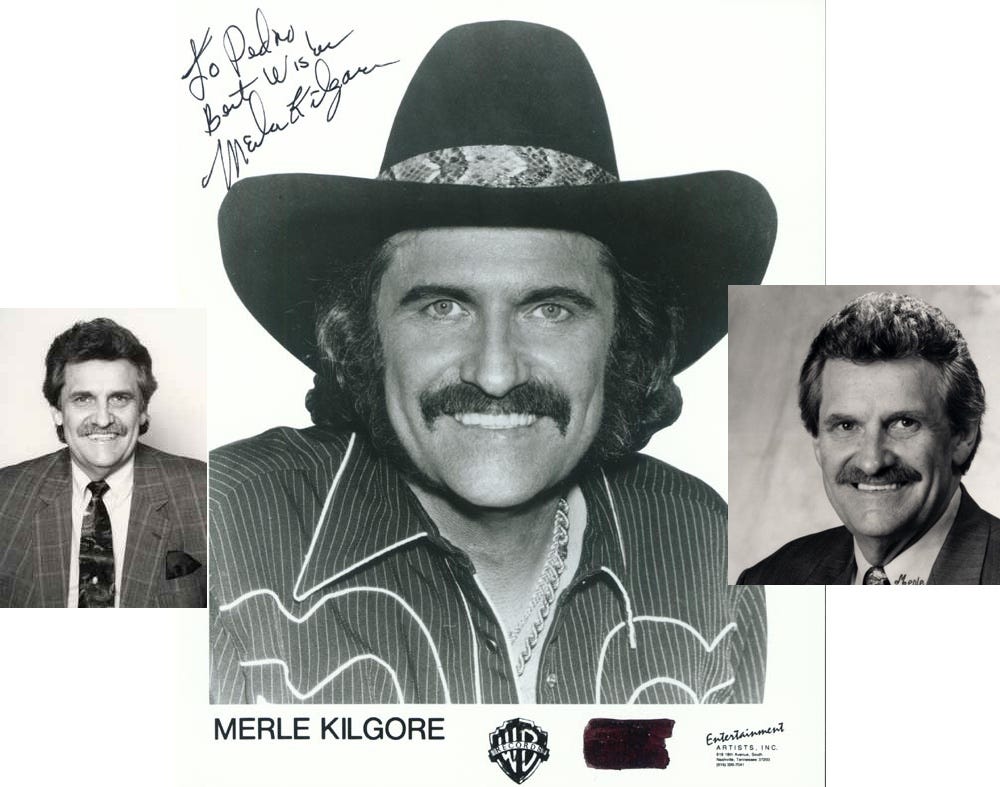Thirty-nine years ago this week, Joe Dobbs’ legendary “Music from the Mountains” show hit the air on West Virginia Public Radio, starting a 25-year run. It also commenced a long connection between the show and The Flood, beginning with the band’s role in recording its debut right up to creating its theme song.
Joe had a long history with radio. In the 1960s, he worked on the air in the West and he was even manager of a station in Albuquerque, New Mexico, but he actually started much earlier than that.
In fact, radio was important for much of Dobbs’ life. In his autobiography, A Country Fiddler, Joe wrote that he grew up listening music on KWKH in Shreveport and KTRY in Bastrop, LA, about 25 miles from the family farm.
It was probably in his freshman year at college that Joe first performed on the air.
In 2016, a year after the fiddler’s death, Joe’s old friend and classmate Sonny Montgomery of Denton, TX, wrote online that he met Joe in 1952 when they were both new students at Louisiana Tech in Ruston, LA.
Young Joe and The Southernaires
Joe and Sonny played together in The Tech Southernaires, a six-member band. Joe was on fiddle and Sonny played steel guitar.
“We actually used Louisiana Tech recording studios,” Montgomery said, “and recorded a 15-minute program which was aired on the local radio every Saturday morning.”
Digging in his old Tech yearbook, Sonny found this snapshot of the group:
Here “Joe was playing upright bass,” Sonny wrote, “as the bass player and pianist were singing a duet for a student body gathering in Howard Auditorium ... We were entertaining the whole campus!”
For years, veterans of The Southernaires had regular Texas reunions:
A year or so before his death in 2015, Joe and his brother Dennis, attended. For months afterward, Joe talked about how much fun they had jamming with those old friends at the Denton County Cowboy Church building.
Meeting Merle
Meanwhile, back at Louisiana Tech, it was also in 1952 that Joe was approach by a young Merle Kilgore, who, according to Joe’s book, said, “I need a fiddler. I’ve heard you play and you’re probably the worst I ever heard, but you’re the only fiddler on campus. I have to have one. Do you want to play some gigs with me?”
Joe agreed, thinking, “Since I’m the only the fiddler on campus, I’m also the best.”
Merle — who later rocketed to success in country music with songwriting credits like “Ring of Fire,” “Wolverton Mountain,” “Johnny Reb” and more — brought Joe into a group that played Saturday mornings on the local station, KRUS.
Merle wanted them to team up — “You should stick with me, Joe,” Merle urged, “and you’ll fart through silk!” — but the fiddler had other plans. When parted a year later, Merle was off for Nashville, Joe for Texas. (After that Joe heard from Merle only a few times over the years, but one of those times was for a beloved segment that Joe and Merle recorded for “Music from the Mountains.” That’s an incident we are likely to feature in a later article in Flood Watch. Stay tuned.)
Texas and New Mexico
It was in Houston that Joe got his first experience as a broadcaster, because a new friend — steel guitarist Bob Priest — “coaxed me into joining him on the radio at Station KTLW in Texas City, TX.”
“We bought an hour of radio time on Saturday morning and sold advertising spots,” Joe wrote in his book. Bob, who was legally blind, had trouble reading the record labels, “so I helped him in the control room,” Joe added.
In 1964, the Dobbs family — Joe, wife Amy and the babies — moved to the town of Farmington in New Mexico, and Joe worked 10 miles away for KHAP in Aztec, 15 miles south of Durango, CO. A few years later, he became station manager for KHIP in Albuquerque, where he stayed a few more years. Slowly, though, his interest in radio was waning.
Joe’s New West Virginia Home
In fact, by the late 1960s, when left the West for a new start in West Virginia, Joe thought his broadcasting days — as well as his youthful dreams of being a professional musician — were behind him. He said he was ready to give up both pursuits. By then in his 40s with a growing family, Joe worked in sales in Huntington. He had stopped playing and even sold his fiddle.
But then in the Mountain State, Joe began hearing the folk musicians all around him in his new home.
When he and brother Dennis opened Fret ’n Fiddle music store in West Huntington, a regular fixture of their new lives was the store’s Saturday morning jam sessions with local pickers.
Ultimately, the Dobbs men bought some decent recording equipment and to start taping the music. Before long, a notion of pitching a live music show to West Virginia Public Broadcasting began a a-borning in Joe’s brain.
Enter The Flood
In the late summer of 1982, Joe called his Flood brothers together — Bill, Dave, Charlie and Roger — and at Fret ‘n Fiddle the band produced a full-fledged demo for a show, with Joe conducting interviews and performing live tunes.
Joe called his still-imaginary show “West Virginia R.F.D,” but, of course, that name didn’t stick. He later selected “Music from the Mountains,” because, as he wrote in A Country Fiddler, he wanted a title “that would give me the freedom to air any type of acoustic music I wanted, such as a folk group or a string quartet.”
The Flood segment — edited with the new name inserted — would be among the first to air when the show became a reality a year later. Click the button below for a nine-minute chunk of that initial show, starting with a rollicking “Mississippi Sawyer,” followed by conversation and two more selections, “Rag Mama” and “Jug Band Music (Certainly was a Treat to Me).”
Joe continued the weekly MftM shows from Nov. 12, 1983, until June 22, 2007, making it one of the longest running shows in West Virginia Public Radio history. Floodsters were frequent guests. And, as reported here earlier, the band also created and recorded the show’s theme song.
Footnote
Two years after the show ended, The Flood was in Lexington, Ky., for an encore appearances on “Red Barn Radio” and Joe took a moment to tell host Brad Becker the story of “Music from the Mountain.” Click the button below to hear Joe’s reminiscences.
















What a great read. Thanks Charles.